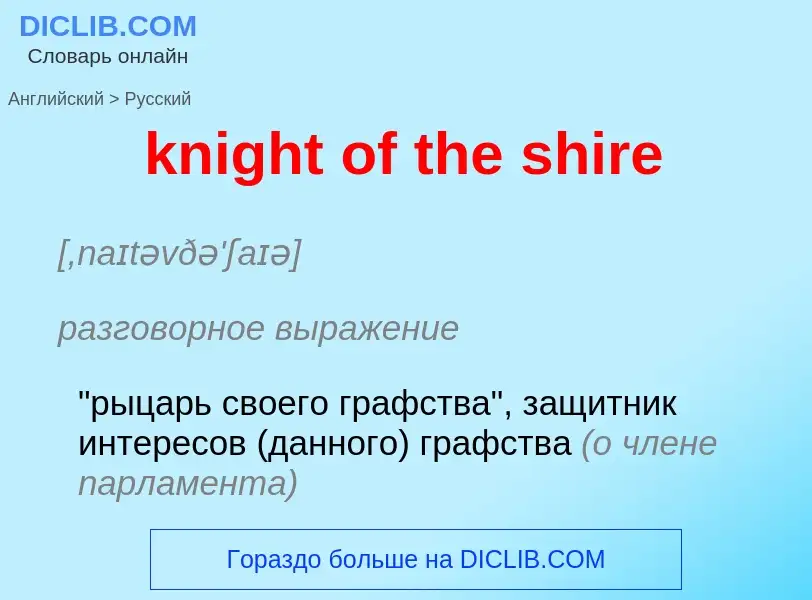Traducción y análisis de palabras por inteligencia artificial ChatGPT
En esta página puede obtener un análisis detallado de una palabra o frase, producido utilizando la mejor tecnología de inteligencia artificial hasta la fecha:
- cómo se usa la palabra
- frecuencia de uso
- se utiliza con más frecuencia en el habla oral o escrita
- opciones de traducción
- ejemplos de uso (varias frases con traducción)
- etimología
knight of the shire - traducción al ruso
[,naɪtəvðə'ʃaɪə]
разговорное выражение
"рыцарь своего графства", защитник интересов (данного) графства (о члене парламента)
['aivibuʃ]
общая лексика
ветка плюща
место укрытия
укромное местечко
Definición
Wikipedia
Knight of the shire (Latin: milites comitatus) was the formal title for a member of parliament (MP) representing a county constituency in the British House of Commons, from its origins in the medieval Parliament of England until the Redistribution of Seats Act 1885 ended the practice of each county (or shire) forming a single constituency. The corresponding titles for other MPs were burgess in a borough constituency (or citizen if the borough had city status) and baron for a Cinque Ports constituency. Knights of the shire had more prestige than burgesses, and sitting burgesses often stood for election for the shire in the hope of increasing their standing in Parliament.
The name "knight of the shire" originally implied that the representative had to be a knight, and the writ of election referred to a belted knight until the 19th century; but by the 14th century men who were not knights were commonly elected. An act of Henry VI stipulated that those eligible for election were knights and "such notable esquires and gentlemen as have estates sufficient to be knights, and by no means of the degree of yeoman".
From Simon de Montfort's Parliament in 1265, each shire sent two knights, and the number was standard until 1826 when Yorkshire gained two additional knights after the disfranchisement of Grampound borough. Under the Great Reform Act of 1832 counties with larger populations sent more knights than smaller ones. The Redistribution of Seats Act 1885 split each multiple-seat shire into multiple single-seat divisions. This change, together with the concomitant standardisation of the franchise, means that county and borough constituencies now differ only slightly, as to election expenses and their type of returning officer.
The term "knight of the shire" has been used more recently in a tongue-in-cheek manner for senior Conservative Party backbenchers representing rural constituencies in England and Wales.

![Part of the Shire created for [[Peter Jackson]]'s films of [[Middle-earth]], on a farm near Matamata, New Zealand Part of the Shire created for [[Peter Jackson]]'s films of [[Middle-earth]], on a farm near Matamata, New Zealand](https://commons.wikimedia.org/wiki/Special:FilePath/Hobbit holes reflected in water.jpg?width=200)
![Bilbo]] and later [[Frodo Baggins]] at Bag End, Hobbiton as filmed in New Zealand Bilbo]] and later [[Frodo Baggins]] at Bag End, Hobbiton as filmed in New Zealand](https://commons.wikimedia.org/wiki/Special:FilePath/Hobbiton, New Zealand.jpg?width=200)
![Industrial buildings by the [[Worcester and Birmingham Canal]] near [[Tardebigge]], Worcestershire Industrial buildings by the [[Worcester and Birmingham Canal]] near [[Tardebigge]], Worcestershire](https://commons.wikimedia.org/wiki/Special:FilePath/Tardebigge Engine House.jpg?width=200)
![Celtic]] ''Breʒ'' and the [[Old English]] ''hyll'', both meaning "hill". Celtic]] ''Breʒ'' and the [[Old English]] ''hyll'', both meaning "hill".](https://commons.wikimedia.org/wiki/Special:FilePath/Brill village from Brill Common - geograph.org.uk - 538330.jpg?width=200)

